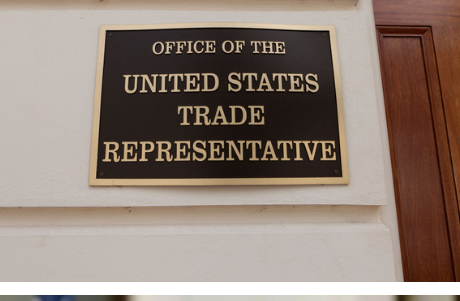By Emily Sims
Washington D.C. – The United States Trade Representative (USTR) has voiced strong concerns regarding Nigeria’s 2016 import ban on 25 categories of goods, arguing that the policy restricts market access for American exporters and constitutes an “unfair trade practice.” The announcement comes just a week after President Trump’s imposition of tariffs on goods entering the US, including a 14% tariff on Nigerian products.
The USTR, in a statement released on Monday via their X platform, highlighted the significant impact of the import ban on U.S. businesses, particularly those in agriculture, pharmaceuticals, beverages, and consumer goods. The banned items include staples such as live or dead birds (including frozen poultry), pork and beef, bird eggs, refined vegetable oil, cane or beet sugar, cocoa butter, spaghetti and noodles, fruit juice in retail packs, water, beer, bagged cement, medicaments, soaps and detergents, mosquito repellent coils, sanitary wares of plastics, used tires, corrugated paper and recharge cards.
“Nigeria’s import ban on 25 different product categories impacts U.S. exporters,” the USTR stated. “Restrictions on items like beef, pork, poultry, fruit juices, medicaments, and spirits limit U.S. market access and reduce export opportunities.”
The agency warned that these policies create substantial trade barriers, leading to lost revenue for U.S. businesses seeking to expand their presence in the Nigerian market.
This critique comes as Nigeria also plans to halt the importation of solar panels, a move announced on March 26, 2025, to promote local manufacturing and accelerate the country’s transition to clean energy.
Nigeria is not the only country facing scrutiny from the USTR. The agency also cited India, Thailand, Kenya, Angola, Algeria, and the European Union for various trade restrictions impacting billions of dollars in potential U.S. exports. Specific concerns included India’s ethanol import ban, Kenya’s 50% tariff on U.S. corn, and the EU’s new environmental compliance rules, which the USTR believes disadvantage American producers.
Angola’s upcoming plan to restrict import licenses for poultry and meat products by July 2025, particularly concerning as Angola is the largest market for U.S. poultry in Africa, was also highlighted.
The USTR emphasized the detrimental impact of these global trade restrictions, stating that they threaten the viability of American businesses, ranging from farmers and fishers to manufacturers and pharmaceutical firms. In some cases, the agency linked these restrictions directly to job losses and business closures across the United States.
The USTR also criticized China specifically for the mass production of American flags, resulting in significant losses for American manufacturers. “Over 100,000 Chinese-made American flags are sold every month on just one e-commerce platform alone, resulting in $2 million in lost sales for American manufacturers, which ultimately leads to lost job opportunities and business closures,” the agency stated, adding, “American flags should be Made in America.”
The USTR’s report suggests a growing tension in international trade relations and signals a potential push for the U.S. to actively challenge what it perceives as unfair trade practices that hinder American businesses’ access to global markets. The future implications of these concerns for U.S.-Nigeria relations remain to be seen.









